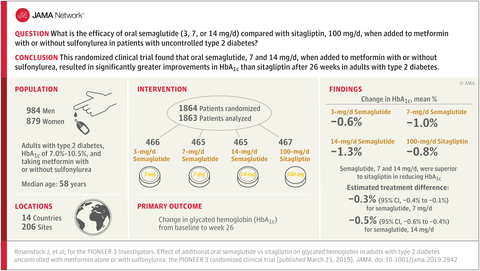Mar 28, 2019
Trend-setting for future therapy of T2D: International consortium with Dresdner participation demonstrates for the first time better efficacy of an orally available GLP-1 agonist compared to DPP-IV inhibitor
With the participation of researchers from the Paul Langerhans Institute Dresden (PLID), partner at the German Center for Diabetes Research, a GLP-1 receptor agonist in the form of tablets could for the first time be compared with the most common second-line therapy of T2D, a DPP-IV inhibitor. The trial was conducted in parallel in Japan, France, England, Mexico, Denmark, the USA and Germany as part of an international, randomized, double-blind study. The results of the PIONEER-3 trial have now been published in the renowned journal ´Journal of the American Medical Association (JAMA)´.
In Germany, about one in ten individuals is affected by diabetes and it is currently estimated that the number of diabetes patients worldwide will rise to about half a billion over the next 20 years. In addition, patients with diabetes still die 2-3 times more frequently from cardiovascular diseases than people without diabetes. Therefore, new blood glucose-lowering drugs that are more effective than the currently available compounds are urgently needed.
For this reason, so-called incretin analogues have been developed in recent years, these are drugs that, like the intestinal hormone GLP-1, lead to the release of insulin in the pancreatic beta cells and at the same time reduce the feeling of hunger in the brain. "Unfortunately, these drugs, like all peptide-based medications have to be administered by subcutaneous injections due to their chemical structure, and cannot be taken orally as tablets," says Prof. Dr. Andreas Birkenfeld, co-author of the study and research group leader at the Paul Langerhans Institute Dresden of Helmholtz Zentrum München at the University Hospital Carl Gustav Carus and the Medical Faculty of TU Dresden. "However, the GLP-1 receptor agonist (GLP-1RA) semaglutide is now being made available as a tablet when combining it with an absorption enhancer. This technology may also pave the way for the future development of tablet forms of other peptides, such as insulin," explains Prof. Birkenfeld.
For the first time, an international consortium, in which Prof. Birkenfeld is also involved, has carried out an international randomized, double-blind study to compare semaglutide in tablet form with sitagliptin, the diabetes medication most commonly prescribed as second-line therapy. The 78-week PIONEER-3 study compared 1864 adults with diagnosed type-2 diabetes who received either metformin (with or without sulfonylurea), oral semaglutide in three different dosages, or sitagliptin (100 mg/d). Oral semaglutide was found to be more effective than sitagliptin (both at the highest tested dose) in lowering blood glucose and reducing body weight. Most frequent side effects of GLP-1RA were gastrointestinal effects. Although these were more common with semaglutide than with sitagliptin, they are already known from other GLP-1RAs and are generally considered safe.
"I am honored that an editorial in JAMA evaluates the PIONEER-3 study as further advancement for the treatment of patients with type 2 diabetes. It is essential that the technology that enables the oral availability of peptide-based drugs was successfully developed. This has been tried unsuccessfully with insulin since 1924, for which reason this breakthrough has been classified as substantial," explains Prof. Birkenfeld. Overall, the results of the PIONEER-3 study together with other recent studies suggest that the introduction of semaglutide, the first oral compound of GLP-1RA in which the subcutaneous agent has shown a positive cardiovascular benefit, is an important addition to the growing list of pharmacological options for the treatment of type-2 diabetes. This study, along with other studies involving the PLID, will have a significant impact on the treatment of patients with type-2 diabetes in the future.
Original publication:
Rosenstock J, Allison D, Birkenfeld AL, Blicher TM, Deenadayalan S, Jacobsen JB, Serusclat P, Violante R, Watada H, Davies M; PIONEER 3 Investigators. Effect of Additional Oral Semaglutide vs Sitagliptin on Glycated Hemoglobin in Adults With Type 2 Diabetes Uncontrolled With Metformin Alone or With Sulfonylurea: The PIONEER 3 Randomized Clinical Trial. JAMA. 2019 Mar 23. doi: 10.1001/jama.2019.2942. [Epub ahead of print]
https://jamanetwork.com/journals/jama/fullarticle/2729339


